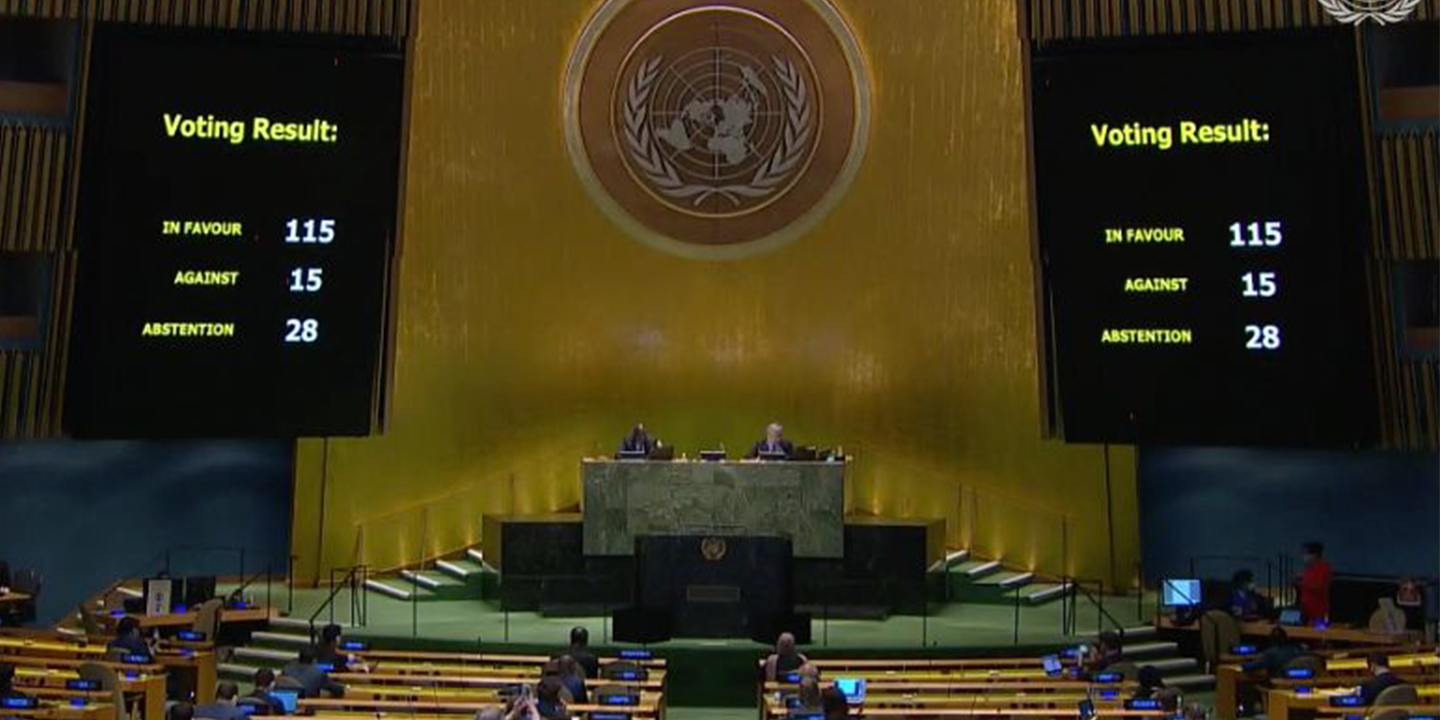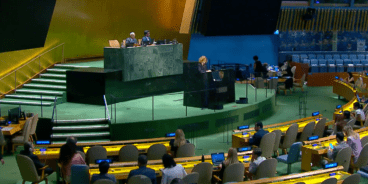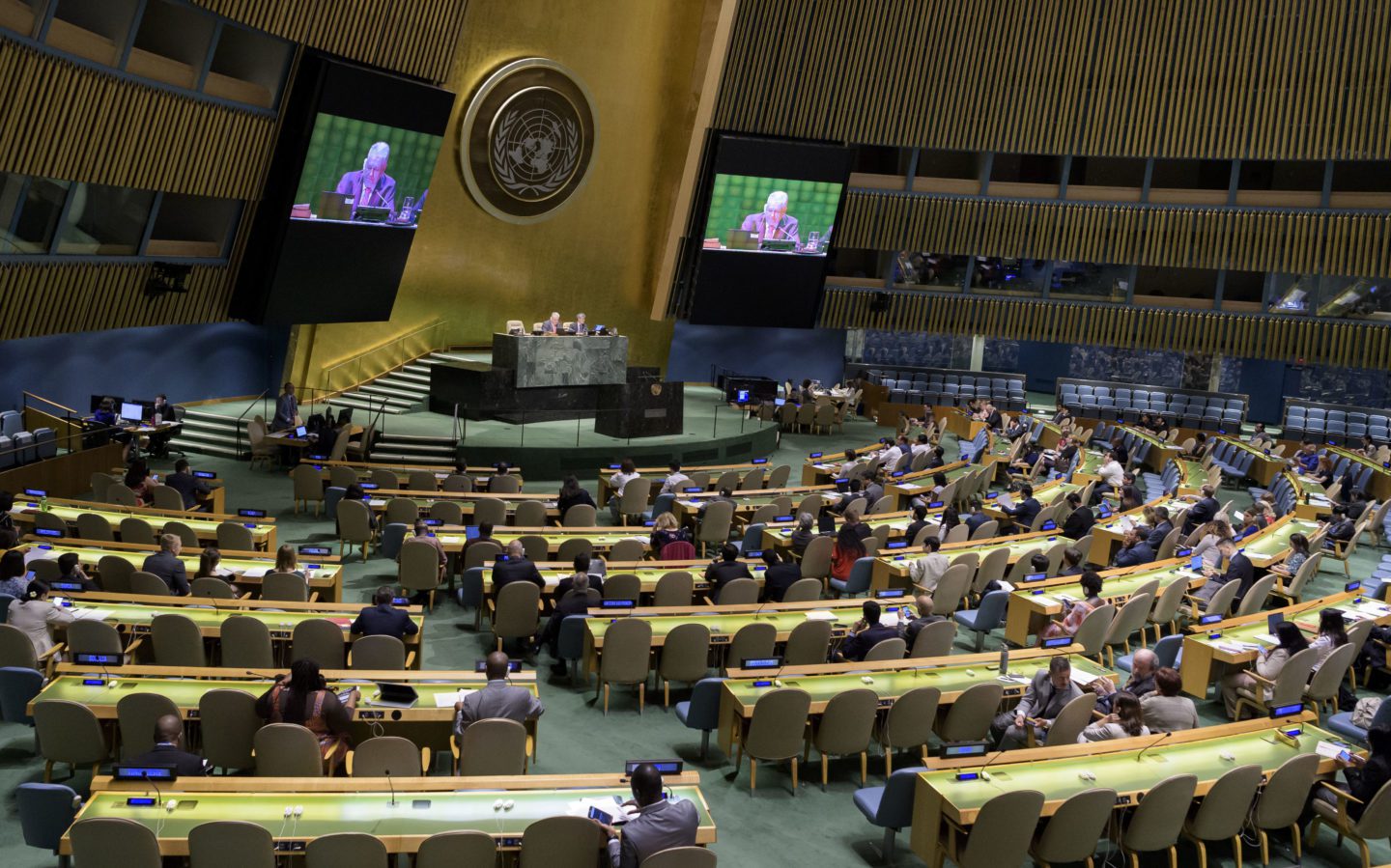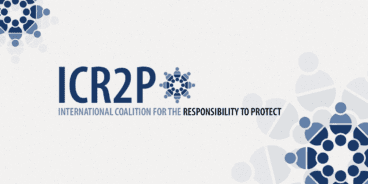
Summary of the 2021 UN General Assembly Plenary Meeting on the Responsibility to Protect
The UN General Assembly held a plenary meeting on the “Responsibility to Protect (R2P) and the prevention of genocide, war crimes, ethnic cleansing and crimes against humanity” on 17-18 May 2021 as part of the formal agenda of its 75th session. The debate constituted the fourth time that the General Assembly formally considered R2P. During the meeting, 59 UN member states and the European Union (EU) spoke on behalf of 88 countries.
The meeting concluded with a vote on a resolution on “The responsibility to protect and the prevention of genocide, war crimes, ethnic cleansing and crimes against humanity.” The resolution was adopted with 115 states voting in favor, 28 abstaining and 15 voting against. With an overwhelming majority of states voting for the historic resolution – the first in the General Assembly since 2009 – UN member states decided to include R2P on the annual agenda of the General Assembly and to formally request that the Secretary-General reports annually on the topic.
BACKGROUND TO THE DIALOGUE
This year’s plenary meeting marks the third time that R2P has been included on the formal agenda of the General Assembly since January 2009. With the adoption of paragraphs 138-139 in the 2005 World Summit Outcome Document and through Resolution 63/308 at the 2009 debate, states committed to ongoing consideration of R2P. Between 2010-2017 member states held eight informal interactive dialogues on R2P following the release of the UN Secretary-General’s annual report on R2P. Debates were held in 2018 and 2019. No debate or informal dialogue was held in 2020 due to the COVID-19 pandemic.
Since 2009 the UN Secretary-General has released thirteen reports on the Responsibility to Protect. This year’s report, entitled “Advancing atrocity prevention: Report of the United Nations Office on Genocide Prevention and the Responsibility to Protect” reflected on how the UN has operationalized R2P. In doing so the Secretary-General provided an overview of how the UN Office on Genocide Prevention and the Responsibility to Protect has led the UN’s efforts to halt the commission of genocide, war crimes, crimes against humanity and ethnic cleansing.
PARTICIPATION OVERVIEW
H.E. Mr. Volkan Bozkir, President of the 75th General Assembly (PGA), opened the debate followed by introductory remarks by the UN Secretary-General’s Chef de Cabinet, Ms. Maria Luiza Riberio Viotti. Reflecting upon continued challenges in protecting populations from atrocity crimes, the PGA noted that, “the flagrant disregard for international humanitarian and human rights law by State and non-state actors, is beyond the pale. The weaponization of food, sexual and gender-based violence, the deliberate targeting of schools and hospitals, and the destruction of religious sites, is unacceptable. At a time of universal suffering, it is unimaginably cruel.” He also reminded member states of their responsibility “to protect civilians; to stop hate speech, when it is first uttered; to protect and uphold the rights of every individual without distinction; to condemn incitement, harassment, and violence against persons or communities; to take timely and effective steps to protect communities that are under threat of mass atrocities; to prevent future acts of genocide; [and] to ensure accountability and justice.”
Opening remarks were followed by interventions from Costa Rica on behalf of 53 members of the Group of Friends of R2P;[1] the EU on behalf of its member states; Estonia on behalf of Latvia and Lithuania; Denmark on behalf of Sweden, Iceland, Finland and Norway; Mexico on behalf of France; and 55 additional member states.
The statement on behalf of members of the Group of Friends of R2P highlighted valuable progress achieved by the UN, member states and other stakeholders, including civil society, in implementing R2P since its adoption in 2005, while acknowledging the reality that in many situations the international community continues to fall short. The Group encouraged states to support the draft resolution on R2P and listed actions states can take in response to unfolding atrocity situations. Twenty-seven members of the Group of Friends of R2P also made statements in their national capacity.
Equatorial Guinea and Bulgaria each spoke for the first time in an R2P debate or dialogue. Fourteen states who have participated in all eleven previous General Assembly discussions on R2P also made statements: Australia, Brazil, Canada, Chile, Costa Rica, Cuba, Iran, Mexico, Netherlands, Republic of Korea, Switzerland, United Kingdom, United States and Venezuela.
RESOLUTION ON R2P
At the start of the debate the Permanent Representative of Croatia, Ivan Šimonović, introduced a draft resolution on “The responsibility to protect and the prevention of genocide, war crimes, ethnic cleansing and crimes against humanity” on behalf of a core group of countries, consisting of Belgium, Botswana, Costa Rica, Czech Republic, Denmark, Guatemala, Luxembourg, Morocco, Qatar, Republic of Korea, Romania, Rwanda and Croatia. The resolution was co-sponsored by 85 additional states.[2]
Introducing the resolution, Ambassador Šimonović noted that, “we believe that having R2P on the annual agenda of the UN General Assembly, as well as mandated annual reports by the Secretary-General, will contribute to furthering the dialogue among UN member states on how to more effectively prevent genocide, crimes against humanity, war crimes and ethnic cleansing. … I hope that this resolution will help us improve prevention. It provides opportunities for serious and structured dialogue on how to achieve that. It is what people of the world expect from us. Its successful adoption will therefore send a very powerful message of hope.”
During the debate, 74 states and the EU expressed support for the resolution, while only four spoke against. Prior to the adoption of the resolution, states were given an opportunity to provide an explanation of vote. Five states – Cuba, Egypt, Indonesia, Nicaragua and Russia – spoke against the resolution and two– Pakistan and Singapore – elaborated upon their decision to abstain.
The resolution was adopted with 115 states voting in favor, 28 abstaining and 15 voting against.
KEY THEMES
The overwhelming majority of participating member states expressed their commitment to paragraphs 138 and 139 of the UN World Summit Outcome Document. While a small minority of states – including China, Cuba, Democratic People’s Republic of Korea, Iran, Syria and Venezuela – challenged application of R2P, the discussion was largely positive.
Noting the continued disregard for international law by many parties to conflicts, the more than 80 million people currently displaced by conflict, and the impact of the COVID-19 pandemic, participants underscored the importance of strengthening both domestic and international efforts to prevent atrocity crimes and protect vulnerable populations. The translation of early warning into early action, however, remains a challenge and many states noted the ongoing crises in Myanmar, Ethiopia and elsewhere.
Support for the Office of the UN Special Advisers on the Prevention of Genocide and the Responsibility to Protect
Seventy-two member states and the EU expressed support for the Office of the UN Special Advisers on Genocide Prevention and R2P.
Reaffirming their support for the Office’s contributions to early warning and prevention, the Group of Friends of R2P encouraged the Special Advisers to constructively engage with UN member states and decision-making bodies. The Group noted that they “encourage the Secretary-General’s two Special Advisers on Genocide Prevention and R2P respectively to use their leadership roles to advance mass atrocity prevention, particularly in the current crises around the world. This includes constructive engagement and open dialogue with Member States, sharing their specialized expertise, raising awareness about the causes and dynamics of atrocity crimes, and identifying measures that could be taken to prevent them. … We urge the Special Advisers to strengthen these efforts and to share their analyses with the wider UN membership and regularly provide the necessary early warning assessments and recommendations on how to prevent atrocities, including to the Security Council, General Assembly and the Human Rights Council.”
Impact of COVID-19 and the Secretary-General’s call for a global ceasefire
During the debate, 26 speakers (on behalf of 70 states) underlined the impact of the COVID-19 pandemic on human rights and deepening divisions within societies. Italy mentioned that “the restrictive measures adopted by states to prevent the spread of the pandemic often had a negative impact on humanitarian logistics [in conflict zones] and exacerbated socio-economic hardship – which is one of the primary triggers of atrocities.”
South Africa underlined that “the COVID-19 pandemic has exacerbated existing vulnerabilities and created new protection challenges. Throughout the world, there has been a surge in stigmatization, hate speech and increased incitement and violence towards national, ethnic, racial, religious or linguistic groups. In addition, state and non-state actors continue to flagrantly disregard the principle of international human rights and humanitarian law. The SG’s call for a global ceasefire has not always been headed – and the deliberate targeting of schools and hospitals, the destruction of religious and heritage sites, the weaponization of food, and widespread sexual and gender-based violence have unfortunately increased since the start of the pandemic.” In this context, 11 speakers (on behalf of 13 states) mentioned the importance of adhering to the UN Secretary-General’s Call for a Global Ceasefire.
Accountability for mass atrocity crimes
The need to ensure justice for victims of mass atrocity crimes was stressed by a large number of states. Sixty-nine states emphasized the importance of prioritizing accountability for mass atrocity crimes in order to prevent their recurrence. Australia noted that, “when states hold perpetrators to account, the prospects for resolution, transitional justice and sustainable peace are strengthened.” Rwanda noted that “at the national level, strengthening rule of law is an integral element of prevention. In addition to this, it is of utmost importance for post-conflict states to invest in efforts aimed at sustaining peace, such as justice and reconciliation.”
States stressed that international and hybrid courts and tribunals, as well as universal jurisdiction, can provide complementary avenues to enable accountability, with 67 states mentioning the International Criminal Court as a crucial instrument to hold perpetrators of genocide, war crimes and crimes against humanity accountable.
Improving early warning mechanisms
The timely identification of risks and early indicators of atrocity crimes can help prevent their occurrence. During the debate, 71 member states emphasized the importance of bolstering early warning mechanisms at all levels. Italy noted the importance of “strengthening the tools for early warning in order to effectively and promptly detect the first signals of disruption.”
In sharing best practices, South Africa noted that “the African Union is integrating risk factors and indicators for genocide, war crimes and crimes against humanity into its continental early warning system and early warning mechanisms in a number of African regional economic communities.”
States also highlighted the significant role that civil society, religious leaders, women and the media can play in developing early warning and response systems at the national level through raising public awareness about human rights violations and possible atrocity crimes.
UN Security Council Inaction
Seventy-four states expressed concern regarding ongoing UN Security Council inaction in situations where states manifestly fail to uphold their responsibility to protect vulnerable populations. Liechtenstein noted that, “with increasing frustration, the world has been observing the inability of the Security Council to do its work. The Council not only refuses to act in many situations where it clearly is mandated to, it also often deprives itself of the tools to address situations early on with a preventive perspective, such as institutionalized briefings from relevant parts of the UN System, including human rights Special Procedures mandate and mechanisms, as well as civil society. This points to significant untapped potential for the Security Council to support pillars I and II of the Responsibility to Protect.”
While serving as an elected member of the Council, Belgium advocated for regular informal preventive briefings with representatives of the Secretariat, in order “to strengthen the Security Council’s early warning capacity, in particular by allowing it to be better informed of situations which could lead to atrocities.”
Canada noted that that “use and threat of the veto in Syria and other situations where atrocity crimes are being perpetrated is shameful and may be contrary to obligations under the UN Charter and international law.” Canada also argued and that “for 10 grueling years, the Security Council has failed the people of Syria. Each veto cast has only ratcheted up the violence and prolonged the suffering of Syrian civilians.” In total, 69 states mentioned the importance of veto restraint when confronting mass atrocities, and many states expressed support for the Accountability, Coherence and Transparency Group’s Code of Conduct regarding Security Council action against genocide, crimes against humanity and war crimes, as well as the French-Mexican initiative on the use of veto in the case of mass atrocities.
Human Rights Council and the Universal Periodic Review
A diverse group of member states referred to the Human Rights Council as a vital institution for operationalizing R2P, with 62 recalling the role that the Council can play in highlighting the risks of atrocity crimes in situations where respect for human rights is deteriorating.
Many highlighted the various mechanisms and tools that can support accountability efforts, including sanctions, fact‑finding missions and commissions of inquiry. Fifty-nine states mentioned special procedures and other investigative mechanisms as being essential to collecting evidence of atrocities, providing early warning and raising awareness of atrocity risks in various countries. A further 14 acknowledged the Universal Periodic Review mechanism as a crucial tool for the prevention of human rights violations around the globe. Ghana noted that it was “useful for conducting national assessments towards risks of conflict and atrocity crimes and assisting states to develop early warning and effective response systems.”
Numerous states insisted on the need to make better use of the UN human rights system and emphasized the necessity of forging closer ties between UN institutions in New York and those in Geneva. Slovenia suggested that “regular briefings by the High Commissioner for Human Rights and Chairs of Fact-Finding Missions and Commissions of Inquiry [to the Security Council] can strengthen the effective prevention of mass atrocities.” Such briefings would, according to the Netherlands, “further strengthen the cooperation and interaction between New York and Geneva, which is pivotal for our commitment to prevent mass atrocities from occurring.”
Cross-cutting issues
Significant progress can be made toward the prevention of mass atrocity crimes when R2P and atrocity prevention are meaningfully linked with other cross-cutting issues. A number of speakers, including the Group of Friends of R2P, noted progress made towards conceptually linking R2P, where appropriate and relevant, with peacekeeping, the Protection of Civilians, and the Women, Peace and Security (WPS) agenda.
Fifty-three member states highlighted the important link between R2P and Peacekeeping. Uruguay, as a troop contributing country, noted that “peacekeeping is one of the UN’s most effective means to prevent atrocity crimes and to protect civilians from such crimes.” The Republic of Korea raised the importance of adequate pre-deployment training for UN peacekeeping personnel: “for enhancing capabilities on civilian protection, such as through gender equality education and ways for strategic communications at local level.”
The Protection of Civilians and prevention of sexual and gender-based violence also featured prominently in the discussion, with 57 countries discussing civilian protection and 31 highlighting tools for the prevention of and accountability for sexual crimes as essential to upholding R2P. Acknowledging the topic of the 2020 Secretary-General’s Report on R2P, participants addressed the need to enhance the role of women in mass atrocity prevention, with 64 states specifically invoking the WPS Agenda and 65 addressing the role of women.
Hate Speech and Incitement
The UN’s Framework of Analysis for Atrocity Crimes highlights a rise in hate speech as a key risk factor for the threat of mass atrocities. Liechtenstein emphasized that, “the impact of hate speech on violence, that in turn may spiral out of control and lead to atrocity crimes, is well known and corroborated by research. The political leadership therefore has a key responsibility under pillar I to take a vocal stance against hate speech and incitement to violence.”
In recent years the widespread use of hate speech on social media has led to the spread of xenophobia and has incited violence. In this regard, the Republic of Korea encouraged all member states “to address the issue of hate speech in collaboration with all relevant actors including tech and social media companies, while also protecting freedom of expression and civil liberties.”
Many speakers raised concern about how the COVID-19 pandemic has triggered increasing levels of hate speech and incitement. The EU noted that conduct that creates “conditions for atrocity behavior, such as stigmatization, hate speech, xenophobia, violence against minorities and violations and abuses of human rights are on the rise.”
Fifty-five states specifically expressed support for the UN Plan of Action on Combatting Hate Speech, while others acknowledged the UN Guidance Note on Addressing and Countering COVID-19 related Hate Speech.
Global Network of R2P Focal Points
Sixty-two countries and the EU emphasized the role of R2P Focal Points in proactively responding to mass atrocity situations. Ghana highlighted the Global Network as an important venue to “strengthen national preventive capacities” and that “active membership of the Global Network can help to translate the 2005 commitment into concrete action for prevention” and called upon member states that have not appointed an R2P Focal Point to do-so.
CONCLUSION
The General Assembly plenary meeting featured diverse perspectives on how best to overcome challenges in implementing R2P and mobilizing collective action for the prevention of mass atrocities. While acknowledging that ongoing atrocities around the globe are a constant reminder of the gap that still exists between the promise and reality of R2P, states constructively discussed practical steps that can be taken in order to better uphold the historic pledge made in 2005. The adoption of a General Assembly resolution on R2P at the conclusion of the meeting was a welcome development in the further institutionalization of R2P within the UN system.
NOTES
[1] The Group of Friends statement was delivered on behalf of the following states and the EU: Argentina, Australia, Bangladesh, Belgium, Bosnia and Herzegovina, Botswana, Canada, Chile, Costa Rica, Cote d’Ivoire, Croatia, Czech Republic, Denmark, Finland, France, Germany, Ghana, Guatemala, Hungary, Ireland, Italy, Japan, Liberia, Liechtenstein, Luxembourg, Mali, Mexico, Marshall Islands, Morocco, Mozambique, Netherlands, New Zealand, Nigeria, Norway, Panama, Peru, Qatar, Republic of Korea, Rwanda, Romania, Senegal, Sierra Leone, Slovakia, Slovenia, South Sudan, Spain, Sweden, Switzerland, Tanzania, United Kingdom, United States and Uruguay.
[2] Additional co-sponsors included: Albania, Andorra, Argentina, Armenia, Australia, Austria, Bangladesh, Brazil, Bulgaria, Cabo Verde, Canada, Chile, Colombia, Côte d’Ivoire, Cyprus, Dominican Republic, El Salvador, Equatorial Guinea, Estonia, Fiji, Finland, France, Gambia, Georgia, Germany, Ghana, Greece, Guinea-Bissau, Hungary, Iceland, Ireland, Italy, Kiribati, Latvia, Lesotho, Liechtenstein, Lithuania, Madagascar, Malawi, Malta, Marshall Islands, Mauritania, Mauritius, Mexico, Monaco, Montenegro, Netherlands, New Zealand, North Macedonia, Niger, Norway, Panama, Papua New Guinea, Paraguay, Peru, Poland, Portugal, Republic of Moldova, San Marino, Senegal, Slovakia, Slovenia, Spain, Sweden, Switzerland, Timor-Leste, Tuvalu, Ukraine, United Kingdom, United States, Uruguay and Zambia.
Related Content

Summary of the 2024 UN General Assembly Plenary Meeting on the Responsibility to Protect

